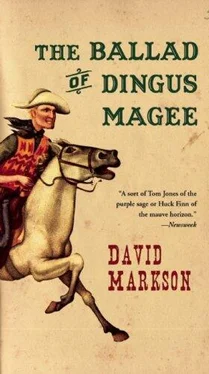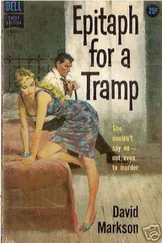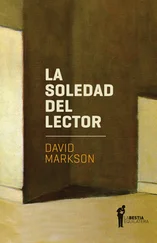“Well hang it all,” Dingus demanded, “what do I care about that? What has that got to do with—”
“Well, I’m getting there, if’n you’ll be patient,” Redburn Horn declared. “Because it weren’t no more’n half a week later, and darned if’n he weren’t back again. This whole affair itself weren’t no more’n eight, ten days ago, incidentally. So anyhow this time the sheriff gets holt of him right quick, but now the Injun promises he won’t commit no more public nuisances. Because anyways he don’t intend to be here long enough for that, not this visit. Because this time what’s he do but parade right on into the courthouse and ask for a paper to be notarized. And not only is the paper writ in English, and by his own hand, but darned if’n he don’t talk the language better’n most native-born white folks, too. And what’s the paper, meantimes, but a draft on some Boston bank (or five thousand dollars, cash currency of the United States of America, and which the judge verifies for him likewise, and which he then takes on over to Zeke Burger’s clothing emporium and commences to buy clothes with. And not jest regular duds neither, like the usual calico shirt a ordinary Injun’d buy, but the absolutely fanciest stuff Zeke’s got in stock — like striped pants and what do you call them things, frock coats, and a gen-u-ine silk top hat to boot. And by this time there’s half the loafers in town looking through the window, of course, and after that when he walks on over to the stage office and asks for a ticket for as far north as you got to travel to catch a railroad train to Massachusetts, well now there’s not only the remaining half of the loafers but a good smart of the working folk in addition. And after this when it develops there ain’t no transportation until tomorrow, darned if’n the next thing he don’t do is march across to the hotel and request a place to sleep — and not jest no plain bedroom neither, mind you, even though the last time the polecat was in town he’d reposed under a cottonwood tree fer four consecutive nights, but he wants a whole durned sweet. Now old Phineas Austin back of the desk, he ain’t about to rent out no room or no sweet neither, not to no redskin, even if’n the redskin does happen to be outfitted like some Egyptian duke or something, but then the judge tells Phineas he better go ahead or else the Injun is apt to purchase the whole danged hotel and fire him. Because what happened is this. He were a full-blooded Comanche all right, but it seems when he was maybe nine years old he got lost one time, and hurt too, and some white folks in a passing stagecoach got holt of him — not only jest took care of him fer a spell, but finally even brung him all the way East and give him a education. Name’s White Eagle in Comanche, but it’s also Sidney Lowell Cabot Astor or some approximate thing in American, all plumb legal from where them Easterners eventually adopted him to boot. Evidendy he’d got restless after a spell, and had come back on out this-a-way, but now all of a sudden his foster father had caught the dropsy and died. Letter must of got to the reservation while he were in town here perpetrating that turdheap the week before, I reckon, but anyways he’d done inherited something akin to ten full street-blocks of downtown Boston, if not to mention a whole fleet of ocean-traveling boats, and some railroads, and the biggest law company in the state of Massachusetts. I forgot to mention that part, that he’d got educated in the law hisself. And that was when it came to pass with Drucilla, you see, when the judge happened to remark about that. Because I reckon you been away too long to know, but that Drucilla, why she jest had her heart set on marrying up with a lawyer feller, fer, oh, at least two or three months now, Dingus—”
That was something less than half a year ago. At first Dingus had been more confused than dismayed, but the confusion had stemmed from just the fact that there was no dismay. So it took him only a few days to realize that he had actually ceased to think about Drucilla a good while before. All he really cared about was that safe.
Nor was it the money either, the sixty or eighty thousand dollars which might surprise him by being considerably more than that. It was principle. Yet he did not rush back to it, on the premise that man cannot rush destiny anyway. Instead, he dropped hints and promoted rumors until some four thousand five hundred dollars in new rewards had accrued to his name. And even then he thought of this as mere exercise, as a sort of renewed apprenticeship before the ultimate, irreproachably professional enterprise of the safe itself.
But it amused him to wait, also, since it further enhanced the mood of anticipation. Deliberately he set out on a long, aimless journey into Old Mexico, where he had never been, to prolong it.
So then in Chihuahua he caught dysentery, a case so extreme that it not only postponed his return to Yerkey’s Hole for some months, but precluded mobility of any sort in the interim. “Less’n I want to leave a trail clear across the territory that even a old stuff-nosed mule-sniffer like Hoke Birdsill couldn’t miss,” he said.
Then, when he did return to New Mexico, the first thing he discovered was that the bounty on his head had mysteriously more than doubled, in major part because of a posting by something called the Fairweather Transportation Company, of which Dingus could have sworn he’d never heard. “But maybe I ought to get to it at that,” he decided, “ifn they even made it a criminal offense when I shit now.” He was some two weeks’ distance from Yerkey’s Hole when he picked up an innocuously moronic drifter named Turkey Doolan and headed west.
He had no attack in mind, only an abiding, bemused sense of confidence, as if the entire project were now less a matter of premeditation than of ordination, of fate itself. And even when Hoke Birdsill turned out to be as irascible as ever, not only banging Turkey Doolan from the saddle but wounding Dingus himself, Dingus remained merrily undaunted.
So he was still laughing, still delighted with the world he had merely put off conquering until tomorrow, when he took time out to deceive a drab, horse-faced woman named Agnes Pfeffer.
“Well, anyways,” he rationalized some few hours later, “at least it were a nostalgic sort of error, since I’m darned if’n she dint remind me jest a trifle of both Miss Grimshaw and Miss Youngblood theirselves.”
So it wasn’t Hoke Birdsill he was angry with tonight when he awoke in the bleak, familiar cell, of course, it was his own irresponsibility. Because he actually believed the conclusion he was to reach once Hoke left him alone to brood over his new incarceration. “That’s it, sure as outhouses draw flies,” he declared in resignation, fingering the swelling lump behind his ear. “A feller has to face life without a mother to guide him, he’s jest nacherly doomed to tickle the wrong titty, ‘times.”
Nor would there be any solution quite so simple as talking his way into a fake escape this time, Dingus knew. In fact Hoke seemed determined to give him no opportunity to talk about anything at all, since it had been well before ten o’clock when he departed, voicing his intention to look in on the indisposed Miss Pfeffer, and now at eleven there was still no sign of him. Although perhaps it was not quite eleven at that, since Dingus still made use of the old, engraved watch of his father’s which cousin Magee had given him, and it had long ago ceased to be reliable. “But jest the fact that I keep it proves I’m downright sentimental at heart,” he mused, “which shows all the more how I would of surely paid dutiful heed to a mother’s advice.”
Meanwhile the confinement had already begun to annoy him physically, albeit mainly because he was still unable to sit. He had dressed himself, once Hoke had removed the handcuffs, but he had been pacing restlessly ever since. On top of which it hurt where Hoke had bushwhacked him in Miss Pfeffer’s bed.
Читать дальше












